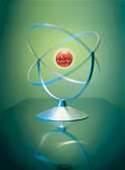
Both the electron and nucleus behaved as tiny quantum magnets capable of storing quantum information.
"The electron acts as a middle-man between the nucleus and the outside world, " said John Morton, a research fellow at Oxford's St. John's College.
"It gives us a way to have our cake and eat it--fast processing speeds from the electron, and long memory times from the nucleus."
While memory has been stored in a nucleus for just one tenth of a second the team managed to keep the information accessible for nearly two seconds.
Researchers studying quantum computing recently calculated that if a quantum system could store information for at least one second, error correction techniques could then protect that data for an indefinite period of time.
"Nobody really knew how long a nucleus might hold quantum information in this system," said Steve Lyon, leader of the Princeton team.
"With crystals painstakingly grown by the Berkeley team and very careful measurements, we were delighted to see memory times exceeding the threshold."



_(23).jpg&h=140&w=231&c=1&s=0)
_(28).jpg&h=140&w=231&c=1&s=0)





 iTnews Benchmark Awards 2026
iTnews Benchmark Awards 2026
 iTnews Executive Retreat - Security Leaders Edition
iTnews Executive Retreat - Security Leaders Edition
 iTnews Cloud Covered Breakfast Summit
iTnews Cloud Covered Breakfast Summit
 The 2026 iAwards
The 2026 iAwards











_(1).jpg&h=140&w=231&c=1&s=0)



